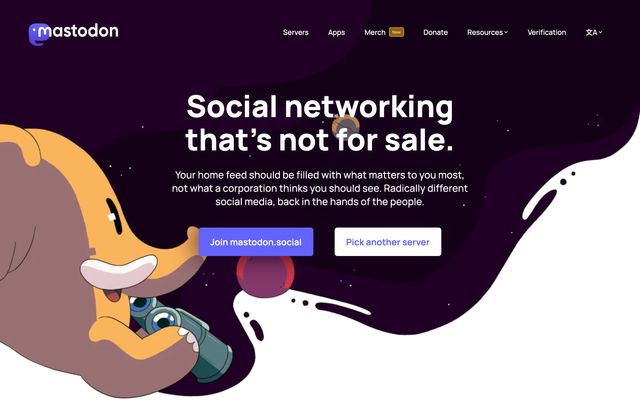Try Mastodon

In the wake of the 2024 U.S. election, a bunch of my friends are abandoning other corporate social media options and flocking to Bluesky. I may as well put in a pitch for Mastodon as well.
I won’t say it’s better than Bluesky. There’s things I really like about Bluesky’s approach. I find the AT Protocol intriguing. I genuinely hope it succeeds. I’ll only say that it is still a venture capital funded product with no established business model. I’ve learned to be skeptical of those. It may be better in practice than other options, for the moment, but it’s subject to the same pressures. This may change over time – they certainly express a commitment to doing things differently – but for the moment, that’s still theory.
Mastodon is already different. The software itself is developed by an NGO funded with donations and grants. It builds on a public protocol for social media applications called ActivityPub developed by the same standards body that established the foundations of the web itself (HTTP, HTML, CSS, etc.). It’s run across a variety of instances that each have their own governance and funding but interoperate with each other. It is truly decentralized and federated.
Bluesky is developing a protocol to be federated similarly, but at the moment this is theory only. There is one and only one place where you can use Bluesky which, as far as I know, is one bad funding round away from disappearing forever and taking every Bluesky account with it.
Mastodon is more robust. The software has multiple forks with different people maintaining them – even if the NGO disappears tomorrow (unlikely) it seems like there’s enough community energy to maintain the software for a while to come. The federated model means that one instance can disappear, even the largest one, mastodon.social, which will take with it the content of users on that instance, but leave intact the rest of the network with its millions of users.
Again, I won’t say it’s better than Bluesky. It has its own issues:
-
People find the decentralization thing confusing – though I think people also often overthink it. It works like email. Some people use Gmail, some use Proton Mail, some use Fastmail, but they all work together. If you just want to get an account without thinking about it, sign up for mastodon.social, the mega-instance run by the NGO.
If you want something more specific, do some research on different instances. (I use social.coop, which is cooperatively funded and governed and I’ve had an account there for 7 years.)
-
The culture can be occasionally off-putting. People are trying to create and enforce social rules for how social media should work. Some of them seem to resent latecomers. The culture has improved somewhat over time as more people have joined and social norms have developed more organically, but it can still take some people by surprise.
-
There’s fewer of us there. It’s the nature of it versus the VC- and corporate-funded options at the moment. You’re less likely to find your friends there. There’s also many fewer companies and public figures – you may find this to be a pro or a con.
-
Depending on what server you choose, it may be less stable. (I like and trust my server and recommend it, but you do have to pay a small membership due. I think the flagship mastodon.social instance is also unlikely to disappear.)
-
Discoverability isn’t as good – you may have to put in some effort to find people you’re interested in following.
But for a certain type of person it’s really good. I’ve found the maker (3D printing and fabricating of various kinds) community there to be surprisingly active, more than any of the other communities I’ve interacted with there. I even bought my 3D printer from someone I met on Mastodon.
There’s also a strong open-source technologist presence, as you might expect. If you’re a maker, a tech nerd, or you like hanging out with such folks, you might find your people there. If you also have strong lefty political views, you’ll find those there too.
It feels to me a lot like the early days of the internet – people connecting and building things in often messy ways, largely unmediated by the influence of venture capital and corporations. It’s probably not for everyone, but if that sounds fun to you, it might be worth a try.